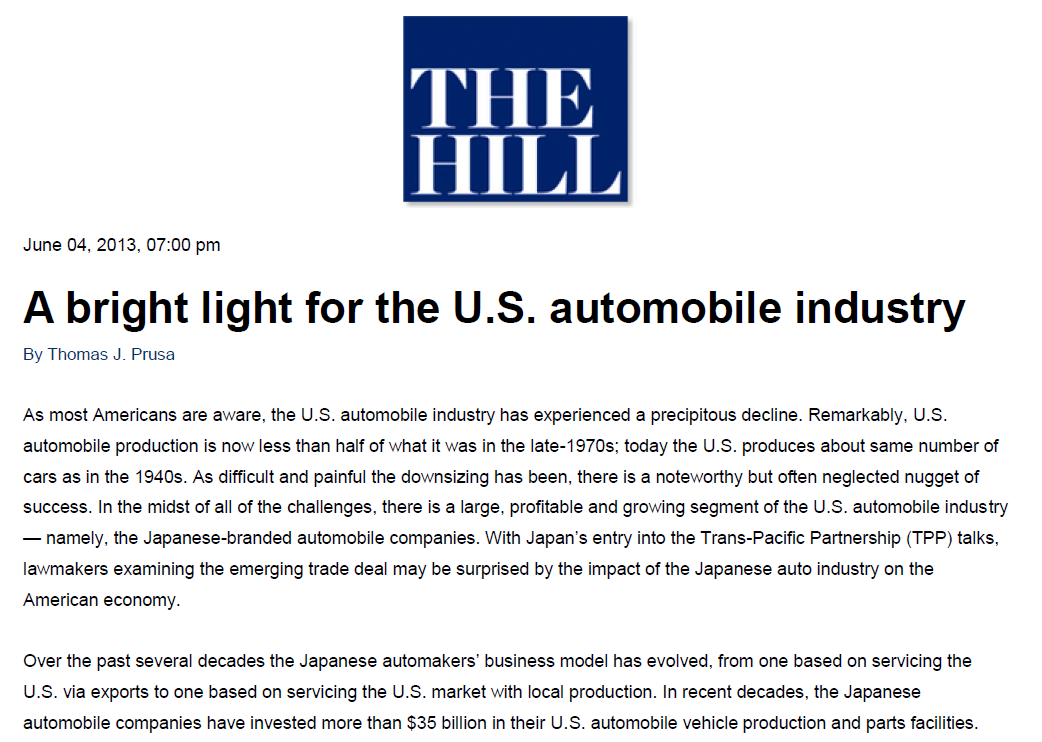By Thomas J. Prusa
June 04, 2013
As most Americans are aware, the U.S. automobile industry has experienced a precipitous decline. Remarkably, U.S. automobile production is now less than half of what it was in the late-1970s; today the U.S. produces about same number of cars as in the 1940s. As difficult and painful the downsizing has been, there is a noteworthy but often neglected nugget of success. In the midst of all of the challenges, there is a large, profitable and growing segment of the U.S. automobile industry — namely, the Japanese-branded automobile companies. With Japan’s entry into the Trans-Pacific Partnership (TPP) talks, lawmakers examining the emerging trade deal may be surprised by the impact of the Japanese auto industry on the American economy.
Over the past several decades the Japanese automakers’ business model has evolved, from one based on servicing the U.S. via exports to one based on servicing the U.S. market with local production. In recent decades, the Japanese automobile companies have invested more than $35 billion in their U.S. automobile vehicle production and parts facilities.
Life was simpler for our parents: a vehicle with a U.S. nameplate was built in the U.S. — likely in Detroit — a Japanese nameplate was built in Japan, a German nameplate was built in Germany, and so on. That simple “country name tells all” paradigm no longer holds. Today a vehicle with a “Detroit Three” nameplate is likely to be produced outside the United States. A vehicle with a Japanese nameplate is likely built in North America, probably in a town not far from where you or your family lives.
In the early 1980s, Japanese-branded automakers produced fewer than 100,000 automobiles per year in the United States. By comparison, in 2011 Japanese-branded automakers produced more than 2.4 million vehicles in the United States. Said differently, in the mid-1980s about 10 percent of Japanese-branded U.S. automobile sales were built in North America; in 2011 68 percent of all Japanese-branded U.S. sales were domestically built. This completes a transformation from Japanese vehicles being “foreign cars” to “made in the U.S.A.”
Whatever one’s view of the Japanese automobile companies might have been in the 1970s, the growth of Japanese-branded automobile companies U.S. production now means they are among the leading job creators in the U.S. manufacturing sector. Japanese-branded automobile companies directly employ almost 60,000 U.S. manufacturing and R&D workers.
But those jobs are just the beginning of the job creation.
An additional nine jobs are associated with each worker directly employed in vehicle production at the Japanese-branded automakers’ U.S. plants — almost 200,000 workers are employed in intermediate goods and parts industries that supply the Japanese-branded automakers’ U.S. vehicle production facilities and an additional 325,000 jobs are supported by the direct and intermediate employment (often referred to as “spin-off” employment).
All told, nearly 600,000 U.S. jobs with an average compensation of $65,000 per worker are generated by the Japanese-branded automobile companies’ production facilities.
In a time when job creation has remained mostly flat across the United States, these well-paying jobs are having a significant impact on the sustainability and morale of communities across the country.
The Japanese-branded automobile companies’ also have an extensive dealer network and directly employ more than 315,000 people, and another 339,029 workers are employed in intermediate and spin-off jobs. All told, over 650,000 U.S. jobs are generated by the Japanese-branded automobile companies’ dealer network.
All told, the Japanese-branded automobile companies’ production facilities and dealer networks contribute to an estimated 1.2 million private sector U.S. jobs. This is a substantial figure, especially in light of the ongoing job challenges facing the U.S. manufacturing sector.
The Japanese-branded auto industry in America is an ongoing success story for the United States. American workers should celebrate the Japanese-branded automakers investment and success. The Japanese companies embody a core American value — competition is good for all. The Japanese auto industry’s accomplishments have spurred innovation and efficiency increases by all U.S. automakers. If these trends continue, job and revenue growth in the auto sector will continue to bolster the American economy.
Thomas Prusa is professor of economics at Rutgers University.
Original Source: The Hill
Click to view PDF


